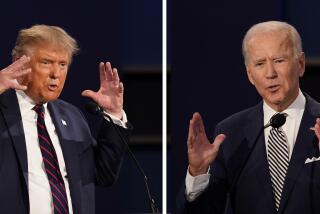Senate Leaders OK Campaign Finance Debate
- Share via
WASHINGTON — Senate leaders agreed Tuesday to a full floor debate on campaign finance reform this year, hours after President Clinton threatened to convene a special session of Congress, if necessary, to take up the issue.
Clinton’s intentions were made known in a letter Tuesday to Senate Minority Leader Tom Daschle (D-S.D.). Daschle, who had been at loggerheads with Senate Majority Leader Trent Lott (R-Miss.) on the issue, had requested the letter.
But shortly after Daschle released Clinton’s letter, he and Lott told an unusually large gathering of their colleagues on the Senate floor to expect the high-stakes debate to begin in late October or early November.
Their announcement marked a breakthrough considered unlikely only a few weeks ago and demonstrated that campaign reform--widely presumed to be a dead issue--is far from that.
However, reform proponents readily acknowledged that huge obstacles remain to a wholesale rewriting of campaign laws. Nevertheless, they were elated that the titanic battle for and against banning soft money and other fund-raising techniques now will be pushed into the open.
“This is exactly what a bully pulpit is for,” said an enthusiastic Sen. Russell D. Feingold (D-Wis.), a co-author of one reform proposal and who has been working closely with top White House aides on the issue.
But one of his bill’s co-sponsors, Susan Collins (R-Maine), reacted far more cautiously, fretting that Clinton’s threat may further inject politics into an increasingly partisan controversy.
Moments later, her concerns proved well-founded.
In a brief interview, Sen. Don Nickles (R-Okla.) struck a combative note, saying that Clinton may be able to invoke his constitutional powers to convene a special session of Congress “but we can also adjourn. He can’t make us pass legislation.”
White House Press Secretary Mike McCurry agreed with that assessment. “We can’t tell Congress what to do. Our Constitution doesn’t work that way,” he said. “But we can keep them here until there’s an adequate time for members of the Senate to be recorded yea or nay on the measure.”
The harshest GOP words came from the office of House Speaker Newt Gingrich (R-Ga.). In a statement, Christina Martin, his press secretary, said:
“If the president would like to call a special session of Congress, we would be happy to spend the extra time investigating with laser-sharp focus any of the 30 current Clinton-Gore scandals.” She went on to list the allegations.
Despite the breakthrough on a Senate debate, Lott refused to say when he will bring up the Feingold bill, co-written by Sen. John McCain (R-Ariz.).
But Lott added: “It’s not my intention to drag this out” to the final days of the session.
Senate leaders hope to adjourn by Nov. 14, possibly a week earlier. The House is anticipating adjournment around the end of October. The GOP majority there has not yet agreed to bring up the issue.
In a testy exchange Friday with Lott, Daschle had refused to agree to a GOP proposal to bring up the McCain-Feingold bill some time before adjournment, saying that would not prevent Lott from bringing up the measure on the last day of the session.
“Now there is no concern for running out of time,” Daschle said Tuesday.
On another matter, partisan bickering erupted as Senate Democrats invoked a rarely used parliamentary procedure to halt all committee hearings in protest of the continuing GOP investigation into a disputed election won last November by Sen. Mary Landrieu (D-La.).
Under Senate rules, unanimous consent is required for a committee to meet beyond two hours after the Senate itself has convened. On Tuesday, Daschle refused to grant his consent.
Among the proceedings interrupted--much to the annoyance of Republicans--was a Finance Committee hearing on allegations of abuses by the Internal Revenue Service.
Also cut short was a hearing by the Senate Governmental Affairs Committee on campaign finance reform. It was taking testimony from two campaign finance experts--Thomas E. Mann, director of governmental studies at the Brookings Institution, and Norman J. Ornstein, an expert on Congress at the American Enterprise Institute.
They made a case for overhauling the fund-raising system even while acknowledging that no reforms solve entirely the problems caused by the mix of big money and power politics.
But panel members expressed starkly partisan views. While Democrats argued that the fund-raising scandal highlights the need for new rules, Sen. Robert F. Bennett (R-Utah), speaking for reform opponents, argued that the reform proposals are worse than the current system.
In all, seven committee sessions were disrupted. It was unclear whether they will be thwarted again today. Daschle called his protest tactics “selective cooperation.”
Clinton’s threat highlighted Article II, Section 3 of the Constitution, which allows a president to convene--as well as to adjourn--either or both houses of Congress “on extraordinary occasions.”
That presidential prerogative has been exercised 49 times since 1791--usually during national crises, such as when President James Madison convened Congress during the War of 1812 and when Abraham Lincoln summoned lawmakers back to town in 1861 after Southern states seceded from the Union.
In his letter, Clinton said that the McCain-Feingold proposal “is of the utmost importance, and it deserves full consideration.”
Times staff writers Elizabeth Shogren and Ralph Vartabedian contributed to this story.
More to Read
Get the L.A. Times Politics newsletter
Deeply reported insights into legislation, politics and policy from Sacramento, Washington and beyond. In your inbox twice per week.
You may occasionally receive promotional content from the Los Angeles Times.










